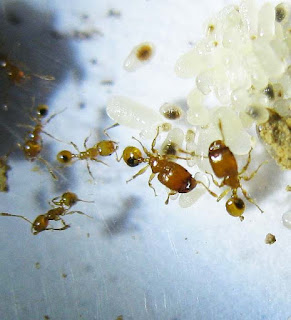The worker (minor) of this Pheidole species at 1.2 mm makes it just 0.2 mm longer than a typical Oligomyrmex worker. The queen is very dark brown to almost black in color. The majority of Pheidole species are monogynous but there are quite a number that are polygnous. Most Pheidole species are also dimorphic but there are some exceptions.
Size comparison. Center is an 0.8 mm Oligomyrmex worker, top a very common small Pheidole species sp1, bottom a typical size Pheidole worker at 2.9 mm and left Pheidole sp7 worker at 1.2 mm.
The ant in the center is an Oligomyrmex minor worker, one of the tiniest of ant at 0.8 mm. Top - the most common small Pheidole species which is found all over Malaysia and S'pore is 1.8 mm. There are several other similar size species but most are larger. Bottom, this is the 'typical' size Pheidole worker 2.9 mm. It is around the size of the worker of Pheidologeton diversus. The one on the left is the currently discussed species at 1.2 mm. I had to 'freeze' these specimens in order to photograph them together. They all soon recovered and went their separate ways. But you can't do this with termites.

The ant in the center is an Oligomyrmex minor worker, one of the tiniest of ant at 0.8 mm. Top - the most common small Pheidole species which is found all over Malaysia and S'pore is 1.8 mm. There are several other similar size species but most are larger. Bottom, this is the 'typical' size Pheidole worker 2.9 mm. It is around the size of the worker of Pheidologeton diversus. The one on the left is the currently discussed species at 1.2 mm. I had to 'freeze' these specimens in order to photograph them together. They all soon recovered and went their separate ways. But you can't do this with termites.

The major worker of a small Pheidole species at 1.5 mm.
The alate gyne of Pheidole sp is very dark brown to almost black in color.
Pheidole sp a worker and major tending to some brood.
Major and minor workers of Pheidole sp.
Minor soldiers of Pheidole sp wih larvae and pupae.
See also:
Taxonomy:
No rank: cellular organisms 131567
Superkingdom (Domain): Eukaryota 2759
No rank: Opisthokonta 33154
Kingdom: Metazoa 33208
No rank: Eumetazoa 6072
No rank (Subkingdom): Bilateria 33213
No rank (Branch): Protostomia 33317
No rank (Infrakingdom): Ecdysozoa
No rank (Superphylum): Panarthropoda 88770
Phylum: Arthropoda 6656
No rank (Subphylum): Mandibulata 197563
No rank: Pancrustacea 197562
Subphylum (Epiclass): Hexapoda 6960
Class: Insecta 50557
No rank (Subclass): Dicondylia 85512
Subclass (Infraclass): Pterygota 7496
Infraclass: Neoptera 33340
Cohort: Holometabola
Order: Hymenoptera 7399
Suborder Apocrita 7400
Infraorder: Aculeata 7434
Superfamily: Formicoidea
Family: Formicidae 36668
Subfamily: Myrmicinae 34695
Tribe: Pheidolini 144015
Genus: Pheidole 190769
First Posted: 2011 04 24
© 2011 - 2022 Quah. All rights reserved.








No comments:
Post a Comment
Sorry Guys, Google Chrome or Blogger bugs prevent me from replying to comments again. It keeps telling me to sign in (even though I am always sign in) but when I click to sign in, it tells me "Unable to sign in check Google profile'. So sorry I can't reply to your comments.
Alternatively you can sent me an email if you are in need of answers.
Note: Only a member of this blog may post a comment.